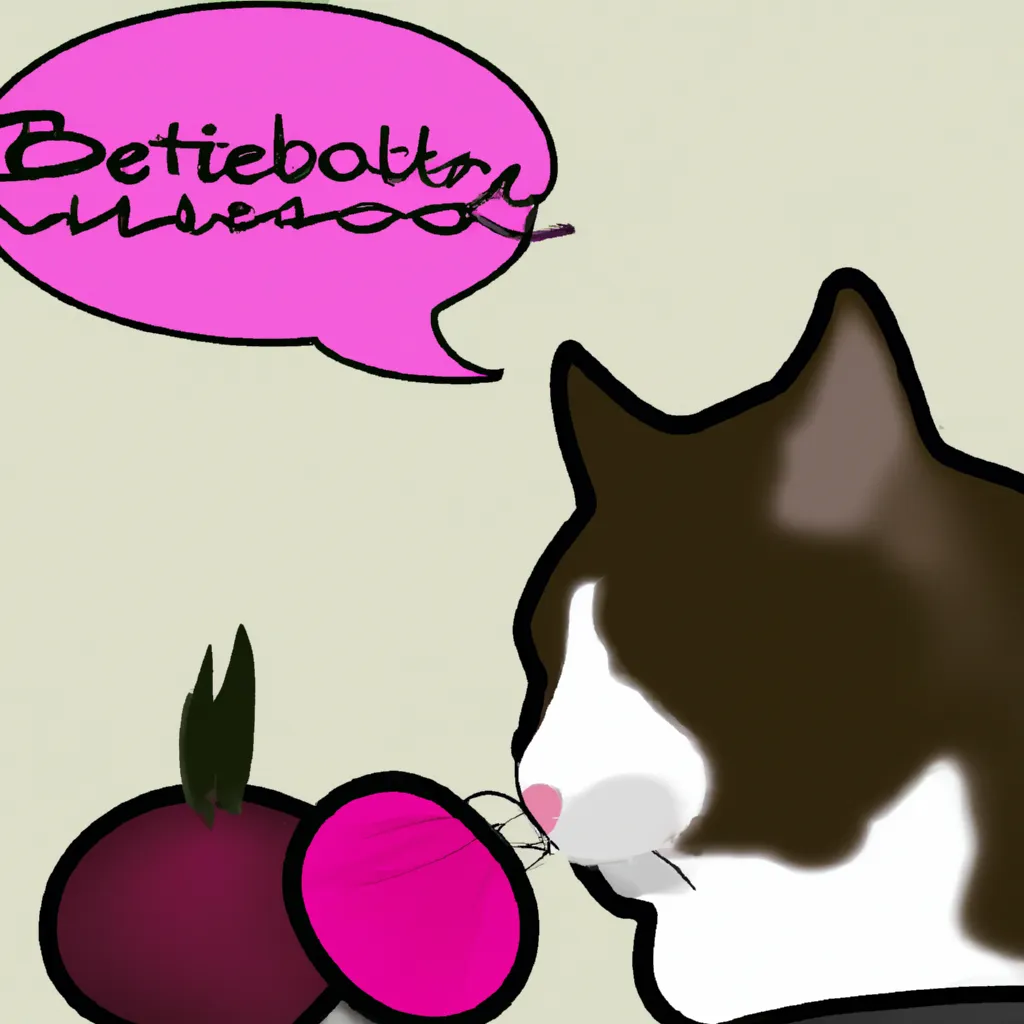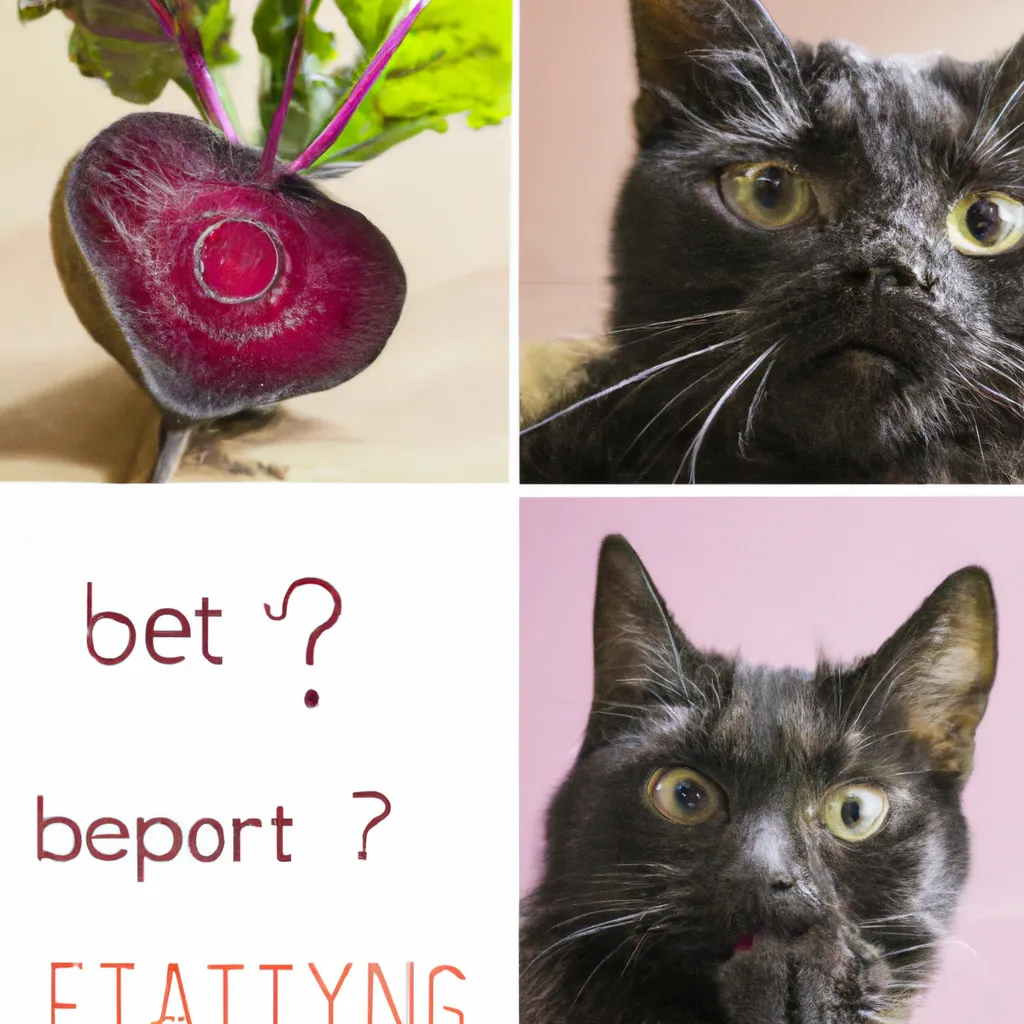As feline aficionados and guardians of our fluffy companions, we often find ourselves pondering the mysteries of their dietary needs and preferences. One question that might have crossed your whiskers-twitching mind is, “Can cats eat beetroot?” This vibrant, earthy vegetable, packed with nutrients, often finds its way onto our plates, but should it be shared with our feline friends? This article delves into the heart of this intriguing query, exploring the potential benefits and risks of beetroot consumption for cats.
Our journey begins with a consideration of whether beetroot could be harmful to cats. We’ll scrutinize the potential symptoms of beetroot poisoning in our feline companions, equipping you with the knowledge to recognize any warning signs. We’ll also delve into the specifics of how much beetroot could be toxic to cats, helping you navigate the fine line between a healthy treat and a dangerous indulgence.
But what if your curious kitty has already taken a nibble? We’ll guide you through the steps to take if your cat has consumed beetroot, providing practical advice to ensure your pet’s wellbeing. And if you’re wondering whether cats even enjoy the taste of beetroot, we’ll shed light on this too, exploring the gastronomic preferences of our feline friends.
From there, we’ll turn our attention to the potential health benefits of beetroot for cats, analyzing whether this root vegetable could be a nourishing addition to their diet. We’ll also discuss the safety of beetroot leaves for our furry friends, expanding our exploration beyond the beetroot itself.
As we journey further into the world of feline nutrition, we’ll suggest safe alternatives to beetroot for cats, and finally, we’ll conclude with a discussion on the best food for cats, helping you make informed decisions for your feline family member’s diet. So, whether you’re a seasoned cat owner or new to the world of feline care, join us as we dig into the beetroot debate, a tale of nutrition, caution, and feline curiosity!

Is beetroot Bad for Cats?
No, but while beetroot isn’t classified as toxic to our feline companions, it’s not necessarily beneficial for them either. Cats, as obligate carnivores, primarily require a meat-based diet for optimal health, and their bodies are not designed to process plant-based foods like beetroot efficiently. Consuming beetroot can lead to gastrointestinal discomfort, including diarrhea and vomiting, due to its high fiber content that’s hard for cats to digest. Additionally, the high sugar content of beetroot can be problematic, especially for cats with diabetes or other health conditions. Therefore, it’s best to keep your cat’s diet focused on high-quality, protein-rich foods and consult with your vet before introducing any new food item.
Why is beetroot bad for cats?
While cats are known to be obligate carnivores, meaning their diet primarily consists of meat, some owners may wonder if it’s safe to give them something like beetroot. However, beetroot is not suitable for cats due to its high oxalate content. Oxalates are naturally occurring substances found in a wide variety of foods, and they’re generally harmless to humans. But in cats, they can bind with calcium in the bloodstream to form crystals, which can lead to urinary problems, including painful urination, blood in urine, and in severe cases, urinary blockages. Furthermore, beetroot is high in sugar, which can lead to obesity and diabetes in cats if consumed regularly.
What are the symptoms of beetroot Poisoning in Cats?
Observing your feline friend closely for signs of beetroot poisoning is crucial to maintaining their health. Cats that have consumed beetroot may exhibit symptoms such as vomiting, diarrhea, lethargy, and decreased appetite. More specific signs of oxalate crystal formation include frequent urination, visible discomfort or pain during urination, and the presence of blood in the urine. In more severe cases, cats may become increasingly lethargic, possibly due to a urinary blockage. If you notice any of these symptoms in your cat after they’ve ingested beetroot, it’s important to seek veterinary attention immediately to prevent further complications.
How much beetroot is toxic to cats?
While there’s no precise quantity of beetroot that’s considered toxic to cats, it’s important to understand that cats have a unique digestive system primarily designed to process meat, not plant-based foods. Consuming beetroot, especially in large amounts, can lead to gastrointestinal issues such as diarrhea or vomiting. While beetroot isn’t classified as toxic to cats in the same way as certain plants or foods like chocolate or onions, it’s not an ideal part of their diet due to the potential for digestive upset and the lack of necessary nutrients it provides for a carnivorous creature. Therefore, it’s advisable to keep your feline friends away from beetroot, focusing instead on a balanced, species-appropriate diet that caters to their carnivorous needs.
Can Cats Die From beetroot?
No, cats are unlikely to die from consuming beetroot, but it’s important to understand that it’s not an ideal part of their diet. Cats are obligate carnivores, meaning they thrive on a diet primarily composed of meat. While beetroot is not toxic to cats, it can cause gastrointestinal upset, including diarrhea and vomiting, if consumed in large quantities. Furthermore, the high sugar content in beetroot can contribute to obesity and diabetes in cats. Therefore, while your feline friend won’t necessarily perish from eating beetroot, it’s best to limit their intake to ensure their optimal health and wellbeing.

What to do if cat ate beetroot? How to help?
If your cat has ingested beetroot, there’s no immediate cause for panic as it’s not toxic to felines. However, it’s important to monitor your pet for any signs of gastrointestinal upset, such as vomiting or diarrhea, as cats are obligate carnivores and their digestive systems aren’t designed to process high amounts of plant material.
Should your feline friend show any discomfort or unusual behavior, it’s advisable to contact your vet promptly. While beetroot isn’t inherently harmful, it can cause digestive issues due to its high fiber content. In such cases, your vet may recommend a mild, easily digestible diet for a few days to help your cat’s digestive system recover.
Prevention is always better than cure. To avoid such situations in the future, it’s best to keep beetroot and other vegetables out of your cat’s reach. Always remember, a cat’s diet should primarily consist of high-quality, protein-rich foods to meet their unique nutritional needs.
What will a vet do if a cat is poisoned by beetroot?
If a cat is poisoned by beetroot, a veterinarian will swiftly initiate a detoxification process, which typically involves inducing vomiting, administering activated charcoal to absorb the toxins, and providing intravenous fluids to support the cat’s hydration and kidney function. This immediate action is crucial as beetroot contains oxalates, substances that can lead to kidney damage in cats. The vet may also conduct blood tests to assess the extent of the poisoning and monitor the cat’s organ function. Furthermore, the vet will likely provide dietary advice to prevent such incidents in the future, emphasizing the importance of avoiding foods, like beetroot, that are harmful to cats.
Do cats like beetroot?
Contrary to what some may believe, cats do not generally have a preference for beetroot. This is largely due to their carnivorous nature and specific dietary needs. Cats are obligate carnivores, meaning their diet should predominantly consist of meat. They lack the necessary enzymes to properly digest plant-based foods like beetroot, leading to potential health issues. While some cats may show curiosity towards beetroot due to its unique smell or color, it is crucial to remember that indulging this curiosity can lead to harmful consequences. As a guardian of your feline friend, it is essential to provide a diet that aligns with their biological needs and to keep potentially harmful foods out of paw’s reach.
Is beetroot good (healthy) for cats?
No and contrary to what one might presume, beetroot, despite its numerous health benefits for humans, is not particularly beneficial for our feline companions. Cats, being obligate carnivores, primarily require protein-rich diets, and the nutritional profile of beetroot doesn’t quite match their needs. While the occasional nibble on beetroot won’t necessarily harm your cat, it doesn’t contribute significantly to their health either. It’s worth noting that cats lack the necessary enzymes to break down plant materials efficiently, which might lead to digestive discomfort if they consume beetroot in large quantities. Also, the high sugar content in beetroot can be problematic for cats, especially those with diabetes. Therefore, it’s advisable to keep beetroot off your kitty’s menu, or at least to serve it sparingly and infrequently.
Can cats eat beetroot leaves?
When it comes to beetroot leaves, the same principles apply as with the beetroot itself. Cats can technically consume beetroot leaves, but that doesn’t mean it’s beneficial or advisable. Beetroot leaves, like most plant matter, are difficult for cats to digest due to their lack of necessary enzymes. Consuming beetroot leaves may result in gastrointestinal issues like vomiting or diarrhea, especially if consumed in large amounts. Furthermore, while beetroot leaves are not toxic to cats, they can sometimes be treated with pesticides or other harmful chemicals that could pose a risk to your pet’s health. So, while your curious cat might be intrigued by the rustling sound of beetroot leaves, it’s best to consider other more suitable options for their dietary needs. Always consult with a veterinarian before introducing new foods into your cat’s diet.
Are there safe alternatives to beetroot for cats?
Yes, there are safe alternatives to beetroot for cats. While beetroot isn’t inherently harmful to felines, it’s not a necessary part of their diet and some cats might experience digestive discomfort. Instead, consider incorporating pet-friendly fruits and vegetables like pumpkin, peas, or carrots into their meals. These are rich in essential vitamins and fiber, and they can be a good addition to a balanced cat diet. However, remember that cats are obligate carnivores and their main source of nutrition should come from meat, not vegetables or fruits.
What is the best food for cats?
The best food for cats is a balanced diet primarily composed of high-quality, protein-rich meat. Cats are obligate carnivores and require a diet rich in animal-based proteins. They need taurine, an essential amino acid found in meat, to maintain their heart health, vision, and immune system. Wet cat food is often the go-to choice for providing this, as it not only contains a high proportion of meat but also helps with hydration. However, it’s also important to consider your cat’s individual needs, such as age, activity level, and health status when choosing their diet. Consultation with a vet is always recommended to ensure the nutritional adequacy of your cat’s diet.
Subscribe to our email newsletter to get the latest posts delivered right to your email.
